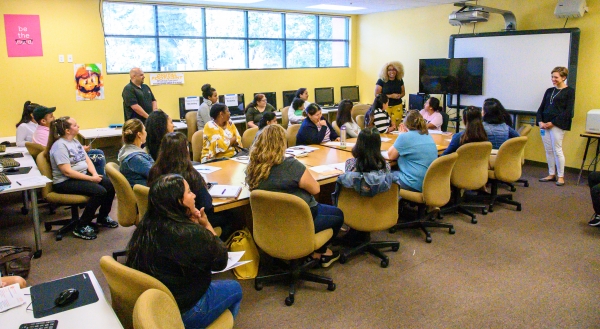San Mateo County will need to fill about 2,500 teaching spots by 2025 to keep pace with the growing need for early childhood education programs, according to a 2016 early learning facilities needs assessment for the county.
The study also predicts that between now and 2025, there will be a shortage of 14,000 classroom spots for children anticipated to live in the county who would be eligible for such programs, according to the assessment.
With these statistics in mind, Menlo Park-based nonprofit Community Equity Collaborative partnered with Foothill College in Los Altos Hills in 2018 to create the Teacher Pipeline Program. The aim: to boost the number of high-quality early education teachers in the area.
The program for this school year started in late September and includes early childhood education courses through the community college, along with meals, child care, coaching and loaner laptops, all free of charge.
"The Teacher Pipeline Program has the potential to become a model for how we can successfully bring new educators into the workforce to address the teacher shortage, expand our capacity to serve more children and professionalize the field," said Peggy Pizzo, director of Stanford University's Early Learning Project, in a prepared statement. "The benefits of such collaborative efforts go beyond its participants or partners as many are watching and hoping for archetypes that can be replicated and scaled."
In its first year as a pilot program, the Teacher Pipeline offered classes in Redwood City through Foothill's child development department.
This year, students can also take classes, which run from September to June, at the Menlo Park outpost of the Boys and Girls Clubs of the Peninsula.
Students can participate in the program to simply bolster their skills, or they can follow one- and two-year pathways to becoming an assistant teacher or a teacher in early childhood classrooms. Courses include child growth and development, prenatal through early childhood; positive behavior management; and how to plan art activities.
For Olivia Saachi, a teacher's aide at the Early Learning Center preschool in Menlo Park, the program offered her a chance to brush up on her prior early learning training and the latest best practices in early childhood education. Saachi, one of the 40 students who took classes in the program last year, plans to enroll in classes this year as well.
The classes "made me much more mindful about how I would talk with children," she said.
Program organizers provide students and their families with dinner 30 minutes before weeknight classes and snacks on Saturdays. The Boys and Girls Club provides programming for children ages 6 to 12 and child care for infants to 5-year-olds on weekday evenings.
One student said the child care and meals helped make it possible for her to take the classes.
"For a single mother, the fact [that I can go to school and have my child at the school day care is phenomenal," she said in a prepared statement from the Community Equity Collaborative.
This student's story illustrates why Community Equity Collaborative leaders thought the program would help bring more people into the early childhood learning field: its access to child care for people who otherwise might not be able to complete such coursework.
"The ROI (return on investment) is pretty remarkable," said Dayna Chung, co-founder of the Community Equity Collaborative, which was formed in 2017 to organize local groups to solve educational inequities. "Communities are paying the price by not having as many women engaged in the workforce and people are definitely needing these child care spaces."
The Redwood City and Menlo Park City school districts are also partners in the collaborative, helping to spread the word about the program. Pati Ortiz, the Redwood City district's community-school partnerships director, helped connect program organizers with SparkPoint, which offers individual online financial and career coaching, Chung said.
This school year, the program is operated through $125,000 in private donations, according to Heather Hopkins, a Community Equity Collaborative co-founder. Half of this funding goes toward tuition costs, she said. These funds also go toward child care expenses, meals and other program expenses.
The nonprofit is pursuing grants to help fund the program that could be used during the second half of the school year, according to the group.



Comments